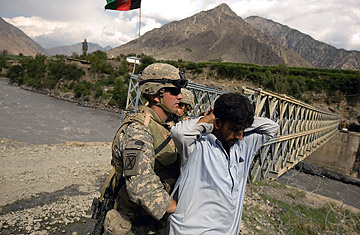
U.S. Army soldiers monitor Afghan National Border Police (ANBP) with and perform identity checks in Dokalam, Kunar in eastern Afghanistan.
The experience of the 10th Mountain Division in Afghanistan may offer a glimpse of what is in store for the rest of America's thinly stretched army after the Pentagon announced, on April 11, that the standard Army deployment in Afghanistan and Iraq would now be 15 months rather than the previous 12-month stint.
Soldiers deploying abroad have always had to contend with missing a child's birth, a sibling's wedding or a parent's death. They face fatigue and frustration no matter the duration of stay. Their spouses suffer at home, and marriages fall apart under the strain of separation. And the stress of deployment in a hostile combat zone has a corrosive effect on discipline. Three more months may not seem that long to a civilian, but to a soldier already on the ground, it's another 90 days in which a lot could go wrong. "It's like running a race," says Chaplain Doug Weaver, of the 3-71. "The longer it is, the more people fall out."
Under the circumstances, the troops at Naray took their extension well, emphasizing the critical nature of their role in Afghanistan. They call it "embracing the suck." "Twelve months is long and hard. Fifteen months is longer and harder," says Sgt. Larry Scott Johnson, Weaver's assistant. "But we are soldiers, and we will accomplish the mission."
Others accentuate the positive, admitting that the extension will allow them to accomplish projects that would have otherwise been dropped, or handed off to incoming troops overwhelmed by the challenge of adapting to the new terrain. As the 10th Mountain prepares to leave Afghanistan at the end of May, Colonel Howard looks back on what he was able to achieve during the period of the extension: A program training Afghan police that has given the provinces of Kunar and Nuristan a more reliable police force; a better relationship with locals forged in regular security meetings with tribal elders; and the establishment of medical clinics and schools. "Our last four months here have been the most effective," says Howard. "I think our national leaders have made the right decision."
Like many of the soldiers who were forced to cancel long-planned vacations, Howard had to forgo a trip to Disney World with his family. "It was disappointing for everyone," he says. "But my goal was to make it worthwhile. I don't want [the soldiers to go home at 16 months] saying that wasn't worth it. Instead they can say, look at what we achieved in four months."
While all the soldiers shared the burden of the extension equally, not all are able to take personal pride in what has been achieved. "Sure the past four months for us were really productive," says Polk. "But for the lower enlisted guys it was much harder. They do the same thing every day and they don't get to see the results of what we are doing here. They are frustrated. I get to see change and success. I see the road, the growth of the Afghan National Army, the government — I'm seeing changes all over, and they are still fixing trucks. It's hard for them."
Extended tours certainly help Army units adapt to a mission that has shifted inexorably from war-fighting to counterinsurgency and nation-building. More time on the ground means that soldiers have a better grasp of the local complexities and personalities that can determine the outcome of their mission. "With a year deployment you have six months of effective time: three months getting up to speed and three months winding down," says Major Thom Sutton, second in command at Naray. But how much can be asked of troops, many of whom have already served three tours? Even with visible successes, burnout seems to be inevitable. "Fifteen months may be good for the mission," says Sutton, "but I don't know if it's sustainable. That's a long time away from home."
The longer tours are accompanied by a guaranteed year at home for soldiers between deployments, a move hailed by many as beneficial for troop morale and important for staving off burnout. But that year includes a rigorous schedule of month-long stints at the National Training Centers and live-fire field exercises that can last days at a time. Even if soldiers are back in the U.S. for a year, little more than half of that time is spent with family, and the next deployment always looms large. "We go home and immediately start preparing for the next deployment," says Polk. He and his wife have been thinking about having children, but the relentless deployments give him pause. "Even if we get pregnant in one week, that means I'll be leaving when the baby is three months old, and I'll come back when it is 18 months. For the first two years of my kid's life, I'll see it for 6 months. That's a lot to ask of a soldier."
Polk is proud of what he has managed to accomplish during his time in Naray. It's a feeling that comes out in his e-mails home, and the way he talks about the tribal elders he has befriended. He's looking forward to the day that he can see a resident of Naray use a mobile phone, turn on a light or drive a paved road to the next district — all projects he and his colleagues initiated during their time here. But those achievements will not be the measure of his success. "We've done a lot of great things, and I want to continue that," he says. "But for me personally, my success is bringing all my boys back home."
